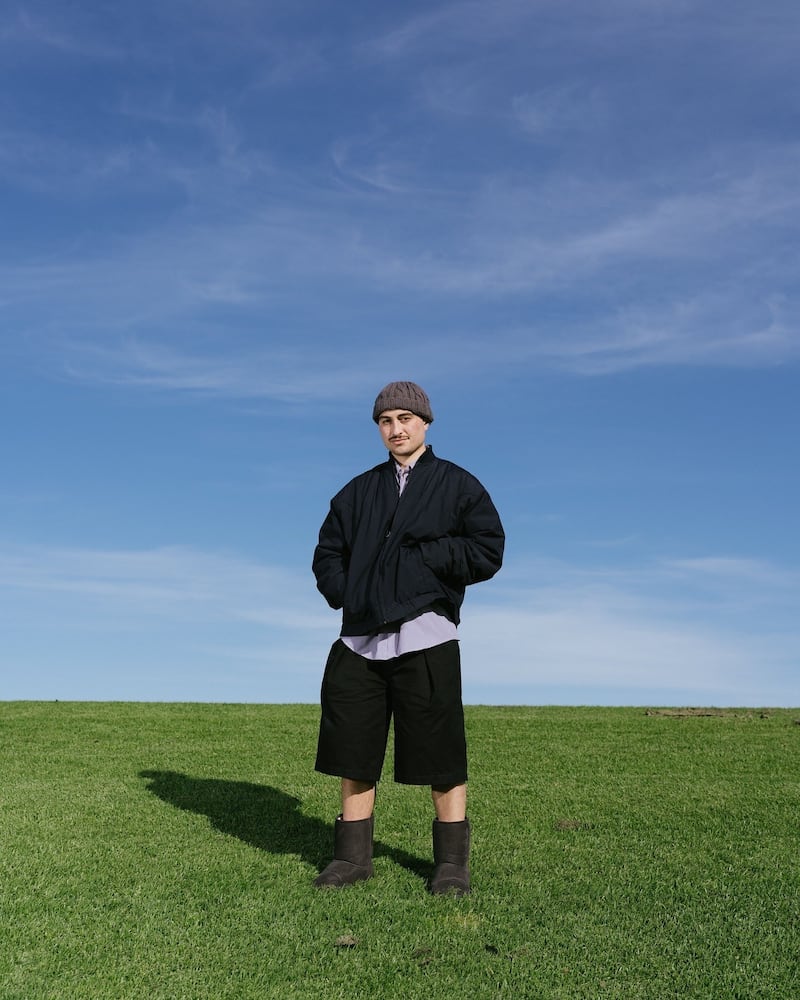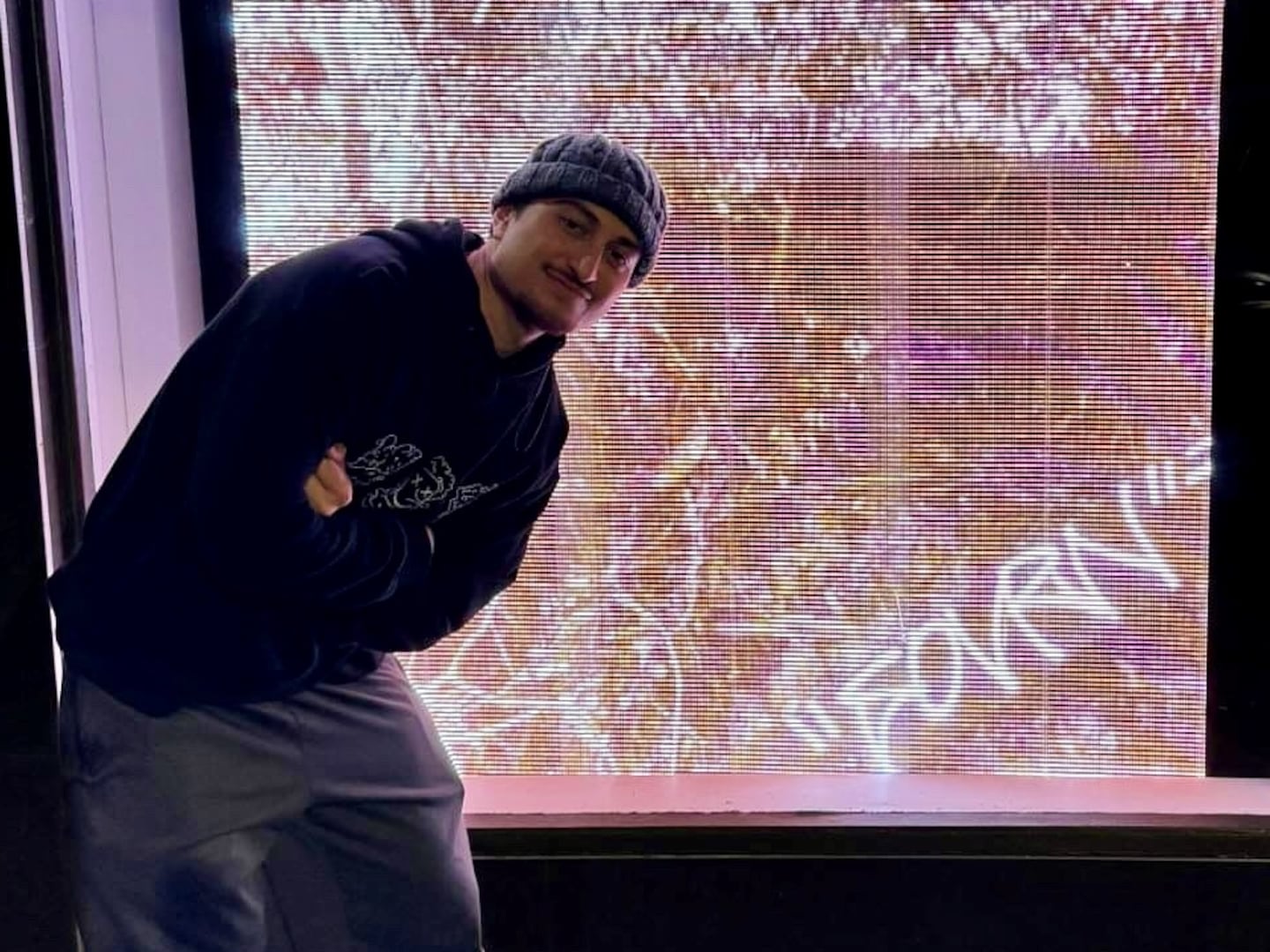The history and nuance of life on Great South Road are the inspiration for South Auckland artist Greatsouth’s new self-titled EP, Greatsouth.
Better known as Fable to fans, the release is the “first stepping stone” in his shift in artist name and musical direction.
Two years from inception to release, Greatsouth, aka Payton Taplin (Ngāti Kahungunu ki Wairarapa, Te Rarawa), says he is “stoked” to finally have the EP out for fans to enjoy.
“I had a nice comment come in and say every time they listen to the EP, their favourite song changes.”
‘Very in your face’
Great South Road, which stretches from central Auckland to Waikato, has a dark colonial backstory as the pathway built to launch British military attacks on Waikato-Tainui for fabricated reasons, culminating in death and destruction and mass land confiscation.
It’s a topic which Greatsouth launches a brutal two-minute eight-second attack on in new track 1863, with its punchy vocal delivery and EDM-like electronica bridge.
“I kind of wanted it in the middle of the project, and it to be a very in-your-face, abrupt kind of change of pace.”
1863
Tahi, rua, toru, whā
You cross the Mangatāwhiri
Didn’t have time but now I got time
You built the road and made cities
Same cities that keep giving me fines
Keep calm stay civil
I’ll keep my head on swivel
Cos after everything we went through
I swear you’re not gonna take what’s mine
I swear you’re not
You’re not
You’re not
You’re not
You’re not gonna take what’s mine
(Lyrics from 1863 by Greatsouth)
“1863 has a very historical connection to the life of Great South Road in terms of when Governor George Grey proclaimed that he was going to invade Waikato.
“For me, the inspiration for it was some of the politics going on at the moment but I also drew inspiration from Governor Grey’s proclamation in 1863.
“I wanted to make something that was a modern-day Māori proclamation version to that,” Greatsouth says.
“It’s gnarly, it’s such a wild thing. And it’s not even that long ago.
“I feel like a lot of people that have that similar sentiment to parties like Act and all of that, don’t understand the gravity of the history in terms of how vile, but also how monumental things were.
“And the context within which Māori used to live, and how all these things happening today, or this situation that Māori are in today as a result of all of this.
“That was where all that inspiration came from. And kind of the feeling, a lot of that is just pushed through the puku kind of yelling.
“Essentially, that whole song is just yelling.”
‘Knowing this horrible politics will pass’
A full frontal attack like 1863 isn’t the only way to deliver a powerful message, Greatsouth says.
“The whole context for the project was built around Great South Road and life - the different kinds of viewpoints and aspects of living connected to the road and living off the road, and stories that could be shared through that,” he says.
“[T]hose kinds of stories for me don’t have to be all in your face like 1863. You can tell the same [stories], you can portray the same feeling.”

Another Day in Tāmaki is a perfect example, sounding deceptively like a love song to Tāmaki Makaurau, with the gentle pitter patter of rain falling and the squeak of fingers sliding along guitar strings - but it is in fact grounded in frustration at the current political attacks on Māori.
“For me, Tāmaki was an outlet. I had written it pre-election results [2023] when there was a whole wave of just nasty politics and typical Māori being a political football for everything,” says Greatsouth.
“I was feeling frustrated - still feel frustrated - but that was kind of the beginnings of that frustration. And, yeah, just an outlet to describe that emotion for me.
“I took a lot of inspiration from our weather patterns in Tāmaki. Like, just the unpredictability, rain being constant but also passing.
“Tāmaki always having this feeling that even if it’s raining today, I know that at some stage, most likely the sun’s going to come out.
“That was kind of for me the core feeling of that song I wanted to portray was kind of melancholy and nostalgic.
“But for me, a hope knowing that, yeah, this frustration will pass, or this nonsense around all this Treaty Principles Bill and all this horrible politics will pass for me.”
The track 2carsparked is similarly subtle - but also packs a gentle punch. It comments on the frustration of not owning a home as Māori, on whenua that was once all Māori.
“2carsparked is kind of a love story or, you know, more of a chill, easy-listening song.
“But it was based on my neighbours. We were renting our old house. We lived just off Great South Road, on one of the side streets, and our neighbours would always park on our lawn.
“I could never mow my lawns. I would always think in my head, if I own this house, if I own this land, maybe I would be able to tell them not to park on my lawn.
“It kind of started off as a bit of an ode to that, I guess not owning the land. It’s those stories for me that don’t have to be all in your face.”
2carsparked
On my front lawn nearly every day
I work too god damn hard to not own the place
I think it’s stuffed up
Another bill another muck up
Cheap thrills never stopped us
From seeing the world from any other bus stop
Yeah I couldn’t muster
All the courage that I’m after
(Lyrics from 2carsparked by Greatsouth)
Greatsouth says his song ‘Popstar in Manix’ from his new EP featured as a theme song last year for Dutch DJ Martin Garrix’s music academy in Sweden.
‘A new take on Māori music’
Greatsouth says he’s “surprised” by the reaction to the EP released about a fortnight ago.
“I’ve had so many messages from people, random people that I don’t even know - not friends and family, just people that are messaging to say that they love the project
“I think it’s a very New Zealand artist thing to be like you don’t want to get too attached to the art, and you get a fear that no one likes it, or you get used to it, just not expecting anything back in return.”
‘Please’ from Greatsouth’s new EP.
Greatsouth had a “little” showcase release at Wheke Fortress in Onehunga recently.
“It was just a small friends and whānau invited thing, all my family and friends.”
He performed several singles from the EP including 1863, already popular tracks Popstar in Manix, Please and the catchy, crowd favourite Nada In My Wallet.
“We had done up the whole space, which was really sick. I wanted the [Governor Grey, 1863] proclamation up on the wall, just as a reference for people. I told everyone, this was an inspiration.”
Greatsouth says his new music is quite different from what people may be used to hearing but is about themes Māori will relate to.
“I’m proud of the work and I feel like now that I sit back and it’s out - and I look at it and I see or hear the feedback and people chat to me about it... - a lot of the sentiment is just like this is such a unique and new take, a new sound and, yeah, a new take on Māori music.
“I guess because I’ve been experimenting and living in the space for so long, it’s not new for me. So I kind of downplay it a little bit in my mind.
Greatsouth’s catchy, crowd favourite ‘Nada In My Wallet’.
“I don’t realise how different it is to what we would typically hear I guess, or engage with as Māori or just in general in New Zealand.
“I’d say there’s a lot to get out of it because it’s very different. But at the same time, very relatable, if that makes sense.”
Greatsouth’s new EP can be found here.


